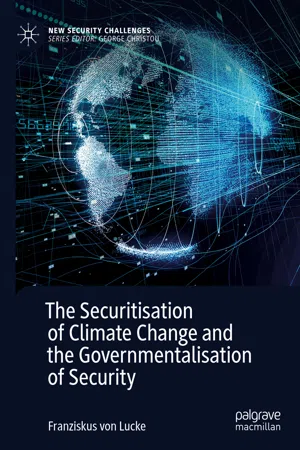
The Securitisation of Climate Change and the Governmentalisation of Security
- English
- ePUB (mobile friendly)
- Available on iOS & Android
The Securitisation of Climate Change and the Governmentalisation of Security
About This Book
This book provides an in-depth analysis of the securitisation of climate change in the US, Germany and Mexico and offers a rethinking of securitisation theory. Resting on a Foucauldian governmentality approach, it discusses how different climate security discourses have transformed the political handling of climate change and affected policies, practices and institutions. Going beyond the literature's predominant focus on the global level, it gives a fine-grained examination of the political and institutional changes in different national contexts. Drawing on the governmentalisation of security, the book develops a new understanding of securitisation that focuses on the role of power. In doing so, it provides new insights into the transformative potential of linking climate change to security but also highlights the political and normative pitfalls of securitisation.
'In this important book, Franziskus von Lucke provides a theoretically sophisticated and empirically rich account of the relationship between security and climate change. Developing a Foucauldian-inspired account of securitization, the book rejects blanket or universal claims about the climate change- security relationship, instead insisting on the need to critically examine how the securitization of climate change plays out in particular empirical contexts. Exploring the cases of the US, Germany and Mexico, von Lucke points to distinctive dynamics of securitization in these settings, with different implications for the practices these in turn encourage. Ultimately, this book constitutes an important addition to literature on the relationship between climate change and security, while developing a distinct and nuanced account of securitization that will be of interest to a wide range of scholars of security in international relations.'
—Associate Professor Matt McDonald is a Reader in International Relations at the University of Queensland, Australia
'In 2019a number of states and other actors (notably the European Union) have made climate emergency declarations. It is therefore more important than ever to understand what the securitization of the climate means. That is: Who can securitize? What security measures are likely/ deemed legitimate by relevant audiences? How does securitization affect the population within and outside a securitizing state? And perhaps most importantly of all, will it succeed? Franziskus von Lucke's carefully researched book offers answers to all of these questions and many others besides. von Lucke proceeds by examining with the US, Mexico and Germany, three real-life empirical cases of climate securitization. Each one provides unique insights that enable a fuller understanding of climate security. Accessibly written this is a must read for scholars and practitioners alike.'
—Dr Rita Floyd, University of Birmingham, UK, author of The Morality of Security: A theory of just Securitization, CUP, 2019
With great empirical detail and conceptual clarity, the book compares discourses and practices of climate security in different contexts. An essential reading for anyone interested in international climate politics, securitization theory, governmentality and the notion of power in International Relations.
—Dr Delf Rothe, Institute for Peace Research and Security Policy Hamburg at the University of Hamburg, Germany
Frequently asked questions
Information
1. Introduction and Theoretical Framework
Table of contents
- Cover
- Front Matter
- 1. Introduction and Theoretical Framework
- 2. United States: Climate Change, National Security and the Climatisation of the Defence Sector
- 3. Germany: Climate Change, Human Security and Southern Populations
- 4. Mexico: Analysing Securitisation in the Global South
- 5. Revisiting the Securitisation of Climate Change and the Governmentalisation of Security
- Back Matter